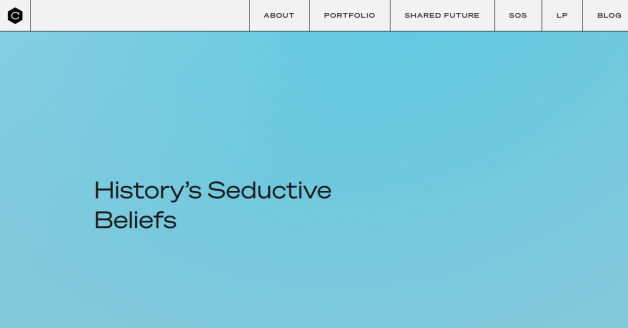What Will Change - And What Will Not
All history is the study of what’s changed, but it’s often used as a guide to the future. The irony is overlooked because the idea that if we gather enough data and read enough books we’ll acquire a map of the future is so seductive – it’s so simple, and makes you feel great. That will never change.

Capital Thinking · Issue #938 · View online
The biggest takeaway from history is that the characters change but their behaviors don’t. The technologies, trends, tragedies and winners – the events that take place – are always in flux and can be nearly impossible to predict.
But the behaviors that drive people into action, influence their thoughts and guide their beliefs, are stable. They’re the same today as they were 100 years ago and will be 100 years from now.
History’s Seductive Beliefs
Morgan Housel | The Collaborative Fund Blog:
Markets change, but greed and fear never do.Industries change, but ambition and complacency don’t.
Laws change, but the tribal instincts of politics don’t.
My deepest forecasting belief is that you can better understand the future if you focus on the behaviors that never change instead of the events that might.
And those behaviors have a common denominator: They follow the path of least resistance of people trying to simplify a complex world into a few stories that make sense and make them feel good about themselves.
Simple stories, feel-good stories. Those are some of history’s most seductive beliefs, and they always will be.
A few that stick out:
1. An illusion that other people’s bad circumstances couldn’t also happen to you. Most of history is slow progress amid constant bad news and occasional terrible news. A seductive story when hearing about tragedy is to believe this awful thing happened to this person, company, or nation, but it almost certainly couldn’t happen to me.
And you may be right about that. Your country may be more stable than the one that collapsed, your business may be stronger than the one that went bankrupt, and your health may be better than the person diagnosed with cancer.
The problem is that people don’t like to think in probabilities; it’s so much easier to think about risk as black or white, it will happen or it won’t.
So rather than thinking your business has a 10% chance of failure, it’s easier to think that what happened to Sears and Lehman Brothers could never happen to you.
Before 2008 you didn’t think there’s a 5% chance of a banking collapse in America; you just looked at what had been happening in Latin America for decades and thought, “that can’t happen here.”
Most of the world didn’t look at Wuhan China last February and think, “there’s a 25% chance that this is our future.”You thought, “I can’t even imagine my town being on lockdown.” Couldn’t even fathom it happening here. That was easier to understand and made you feel better.
When you go through life thinking low-probability events are zero-probability events, you’re bound to get stuck in an illusion that what happened to someone else couldn’t also happen to you.That’s especially true when you add up the low odds of lots of unfortunate events.
If next year there’s a 1% chance of a new disastrous pandemic, a 1% chance of a crippling depression, a 1% chance of a catastrophic flood, a 1% chance of political collapse, and on and on, then the odds that something bad will happen next year – or any year – are … pretty good.“History is just one damn thing after another” the saying goes.
A few years ago I interviewed Yale economist Robert Shiller. He talked about the possibility – not quite a forecast – that home prices could decline adjusted for inflation for a decade or longer.
I asked him why he thought that, or how it could happen. “Well, it happened before,” he said. Real home prices fell for most of the 20th century.
“So of course it could happen again,” even if it seems crazy.

Photo credit: Federico Di Dio photography on Unsplash
